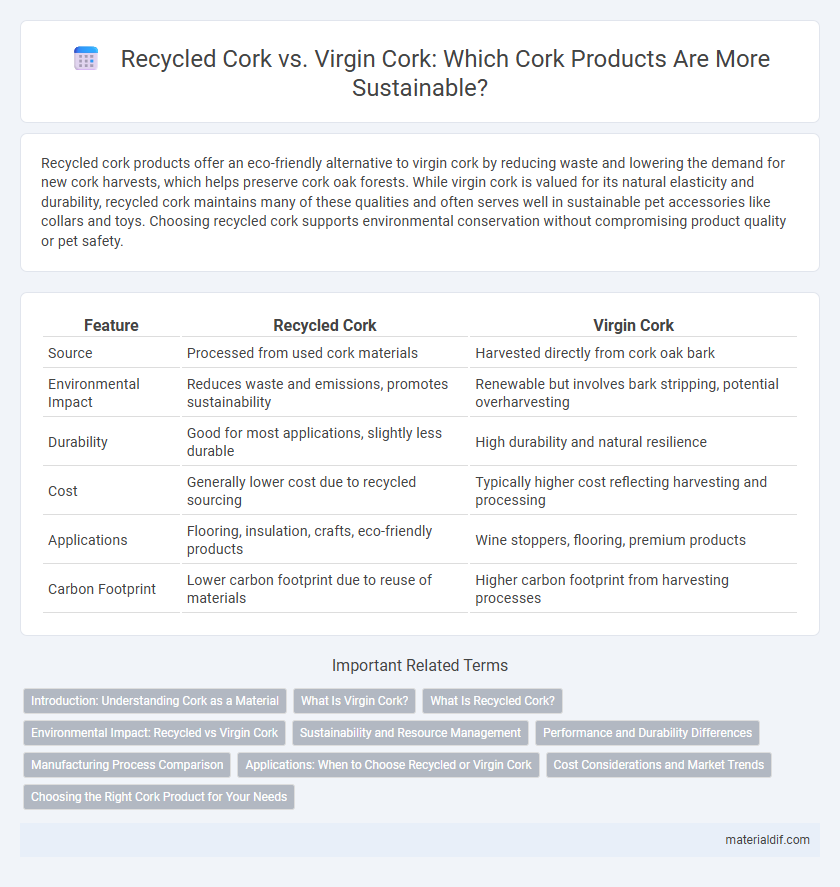Recycled cork products offer an eco-friendly alternative to virgin cork by reducing waste and lowering the demand for new cork harvests, which helps preserve cork oak forests. While virgin cork is valued for its natural elasticity and durability, recycled cork maintains many of these qualities and often serves well in sustainable pet accessories like collars and toys. Choosing recycled cork supports environmental conservation without compromising product quality or pet safety.
Table of Comparison
| Feature | Recycled Cork | Virgin Cork |
|---|---|---|
| Source | Processed from used cork materials | Harvested directly from cork oak bark |
| Environmental Impact | Reduces waste and emissions, promotes sustainability | Renewable but involves bark stripping, potential overharvesting |
| Durability | Good for most applications, slightly less durable | High durability and natural resilience |
| Cost | Generally lower cost due to recycled sourcing | Typically higher cost reflecting harvesting and processing |
| Applications | Flooring, insulation, crafts, eco-friendly products | Wine stoppers, flooring, premium products |
| Carbon Footprint | Lower carbon footprint due to reuse of materials | Higher carbon footprint from harvesting processes |
Introduction: Understanding Cork as a Material
Cork, harvested from the bark of the Quercus suber tree, is a renewable and sustainable natural material prized for its elasticity, impermeability, and insulation properties. Virgin cork comes directly from freshly stripped bark, offering superior durability and uniformity, while recycled cork is processed from post-consumer or manufacturing waste, supporting eco-friendly production and waste reduction. Both types maintain cork's unique cellular structure that provides lightweight, moisture-resistant, and sound-absorbing benefits for various applications.
What Is Virgin Cork?
Virgin cork is harvested directly from the bark of cork oak trees without prior use or processing, ensuring its natural properties remain intact and highly durable. Unlike recycled cork, virgin cork offers superior elasticity, water resistance, and longevity, making it ideal for premium applications such as wine stoppers and flooring. Sustainable cork harvesting practices allow for the bark to regenerate every 9 to 12 years, supporting both environmental conservation and product quality.
What Is Recycled Cork?
Recycled cork is made from repurposed cork materials collected from wine stoppers, flooring offcuts, and manufacturing scraps, reducing the need for virgin cork harvesting. This sustainable option helps conserve cork oak forests and lowers environmental impact by minimizing waste and energy consumption during production. Products crafted from recycled cork maintain the natural properties of virgin cork, such as flexibility, insulation, and water resistance, making them ideal for eco-friendly designs.
Environmental Impact: Recycled vs Virgin Cork
Recycled cork products significantly reduce environmental impact by diverting waste from landfills and minimizing the need for new cork harvesting, thereby preserving cork oak forests and maintaining biodiversity. Virgin cork extraction involves stripping bark from live trees every nine years, which supports forest conservation but requires continuous tree management and can lead to habitat disruption if overharvested. Overall, using recycled cork lowers carbon emissions and resource consumption compared to virgin cork, making it a more sustainable choice in cork-based manufacturing.
Sustainability and Resource Management
Recycled cork products significantly reduce environmental impact by diverting waste from landfills and minimizing the need for new cork extraction, conserving cork oak forests. Virgin cork harvesting demands careful management to avoid overexploitation, promoting biodiversity and long-term forest health in Mediterranean ecosystems. Prioritizing recycled cork enhances sustainability efforts, supports circular economy principles, and reduces carbon footprint compared to producing virgin cork goods.
Performance and Durability Differences
Recycled cork products often exhibit comparable performance to virgin cork, maintaining excellent insulation, elasticity, and water resistance essential for flooring and insulation applications. However, virgin cork tends to offer superior durability and structural integrity due to its untouched cellular composition, which enhances longevity in high-traffic areas. Performance differences derive primarily from the processing of recycled cork, where composite materials may reduce natural resilience but contribute to sustainability benefits.
Manufacturing Process Comparison
Recycled cork products are made by collecting and grinding used cork materials, which are then compressed and bonded without the need for harsh chemicals, reducing environmental impact and energy consumption compared to virgin cork manufacturing. Virgin cork products require harvesting cork oak bark, which undergoes boiling and drying before being cut and shaped, a process that demands more natural resources and processing time. The recycled cork process enhances sustainability by minimizing waste and conserving cork oak forests, while virgin cork production maintains purity and strength in the final products.
Applications: When to Choose Recycled or Virgin Cork
Recycled cork products excel in sustainable packaging, flooring underlays, and insulation where eco-friendliness and cost efficiency are prioritized. Virgin cork offers superior durability and elasticity, making it ideal for high-performance applications like footwear soles, musical instruments, and premium wine stoppers. Choosing between recycled and virgin cork depends on the required product strength, environmental impact goals, and end-use performance criteria.
Cost Considerations and Market Trends
Recycled cork products often offer cost advantages over virgin cork due to lower raw material expenses and reduced environmental impact, appealing to budget-conscious and eco-friendly consumers. Market trends indicate a growing demand for sustainable cork solutions, with recycled cork gaining traction in industries like flooring, fashion, and packaging. Despite slightly higher durability in virgin cork, the cost-effectiveness and sustainability of recycled cork are driving significant shifts in consumer preference and supplier offerings in Cork's cork product market.
Choosing the Right Cork Product for Your Needs
Recycled cork products offer eco-friendly benefits by reducing waste and conserving natural cork forests, making them ideal for sustainable projects and budget-conscious consumers. Virgin cork maintains superior structural integrity and longevity, suitable for high-performance applications like premium flooring and insulation. Assess your project's durability requirements and environmental impact goals to select between recycled cork's sustainability and the robustness of virgin cork.
Recycled Cork vs Virgin Cork Products Infographic

 materialdif.com
materialdif.com